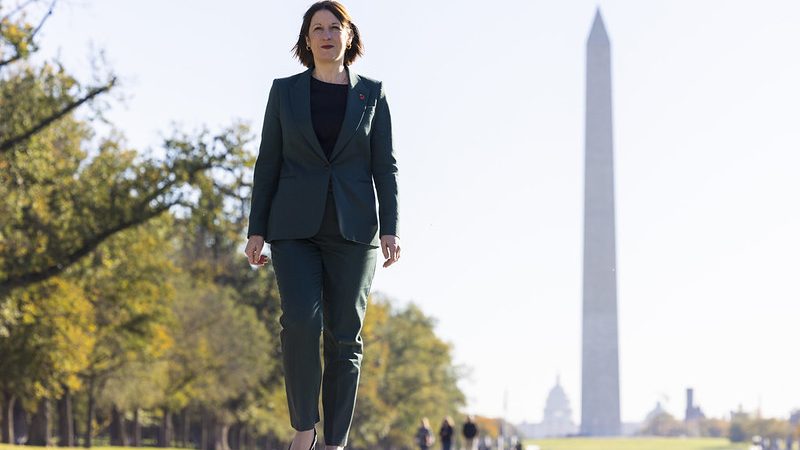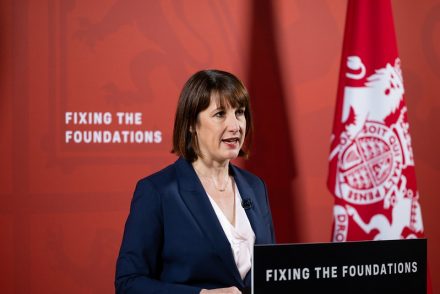
Labour’s first Budget since returning to power is fast approaching, with many of the policies Chancellor Rachel Reeves expected to unveil already emerging ahead of the set-piece on Wednesday (October 30).
It is not only the first time in more than a decade that a Labour Chancellor will take to the dispatch box to deliver a Budget, it will also be the first ever delivered by a woman. The scheduled time for the 2024 Budget is around 12.30pm, after Prime Minister’s Questions (and you can watch the Budget speech live here).
READ MORE: Minister says ‘normal’ for cabinet to seek good deal for departments amid unrest over cuts
A government source briefed media in October that the Chancellor was looking to find £40bn in tax rises and spending cuts, in order to avoid the real-terms cuts to government departments pencilled in under previous Conservative spending plans. Previously the government had spoken of a £22bn “black hole” just to meet existing tight Tory spending plans.
Many measures expected at the Budget have been briefed to the media in advance, and speculation is rife about further potential measures.
Here is a round-up of what policy to expect (if you see anything we’re missing, email [email protected]):
Budget 2024: Tax policy changes expected
Tax: Hikes for capital gains
Labour said throughout the election campaign period that no rises in income tax, National Insurance or VAT (barring private schools) would be levied on working people.
The government has long been expected to hike capital gains taxes to raise revenue without breaking that pledge.
Rachel Reeves once said the party had “no plans” to raise it during the campaign, but the government has repeatedly suggested its Tory inheritance is worse than expected, laying the ground for tax hikes.
Campaigners on the left have argued capital gains should be taxed more to get closer to a level playing field with income tax. The current higher rate of tax on capital gains is around half the higher rate of income tax.
READ MORE: ‘We can avoid taxing workers by hiking capital gains tax’
The Times reported in the lead-up to the Budget that the higher-rate capital gains rate was likely to increase by several percentage points on the current 20% rate levied on earnings above £50,271. It suggested no hikes were likely on capital gains from second homes, but some other reliefs on the tax could be restricted.
Bridget Phillipson told broadcasters on Sunday (October 27) that working people would see no change to taxes “on their payslips” – leaving the door open for capital gains hikes, as the earnings and tax are not linked to employee payrolls.
Meanwhile Keir Starmer suggested recently his definition of “working people” did not include those who earn from shares, though a spokesperson soon clarified he meant those whose main income was from shares.
No rise in income tax – but freeze in thresholds
The Financial Times reported in advance of the Budget that Reeves would extend the freeze on income tax thresholds beyond 2028, potentially bringing in £7 billion a year as pay rises gradually pull more workers over tax thresholds.
The argument is that the decision “would not break Labour’s manifesto tax pledges, because the prospectus only specifically ruled out an increase” in income tax rates, according to the paper.
Fuel and alcohol duty

Fuel and alcohol duty have been targets for tax freezes by previous Chancellors, often intent to bring a splash of good news for drivers and drinkers to otherwise stern and steely Budgets.
A Whitehall source told the media earlier in October that the Treasury “always hated the fuel duty freeze and is determined to get rid of it” – with suggestions a current 5p freeze would end in March and another 1p or 2p could be added.
The Telegraph reported in September Reeves was considering hikes on beer, wine or spirits, with suggestions it could raise £800m a year.
National Insurance hikes for employers
The decision by the Chancellor and the Prime Minister in interviews in mid-October not to quell speculation of national insurance hikes for employers fuelled expectations that rises would be unveiled at the Budget.
It also fuelled a political row as Labour played down Tory and media suggestions it was at odds with the party’s manifesto pledges.
“Labour will not increase taxes on working people, which is why we will not increase National Insurance, the basic, higher, or additional rates of Income Tax, or VAT,” the manifesto said.
Labour figures have repeatedly said their promises only related to workers specifically, though business groups and the Tories have criticised the move as a “jobs tax” that they claim employees will indirectly pay the price for.
READ MORE: ‘No fiscal rule is perfect. But this one means welcome investment’
A government source all but confirmed the move to the BBC last week, saying the government was asking “businesses to help out” to raise cash for the NHS.
The BBC reported in advance that the rate would rise for employers, and the threshold when employers must start paying it would also fall. The broadcaster suggested this would raise around £20bn. The Observer suggested NICs would rise by up to two per cent.
Labour’s manifesto pledge not to increase income tax, VAT or National Insurance was heard often during the election campaign – but loopholes to this pledge were always going to come under the magnifying glass if extra tax revenue became a desperate need.
Speaking on Sky News on October 13, Business Secretary Jonathan Reynolds said the pledge meant Labour would not raise NI applied to employees, but declined to rule out raising employers’ contributions. Other ministers have not ruled the latter out either since.
If Labour goes ahead with this, it’s unlikely opposition attack lines will appreciate the technicalities.
Tax: Inheritance tax could be raised
The BBC said it “has learned” the government is planning to increase the amount of money it raises in inheritance tax at the Budget.
Sources suggested multiple changes were being considered, without giving further detail. There are multiple current reliefs that could potentially be reviewed or cut.
Tax: Stamp duty discount set to expire
The Times reported on October 17 Labour won’t extend the Tories’ stamp duty discount that expires in March, raising the cost of house purchases.
If correct, buyers will have to pay the tax on property values over £125,000 again, rather than the recent £250,000 threshold, while first-time buyers will have to pay it on values over £300,000 rather than £450,000.
Labour’s manifesto pledged to hike the further stamp duty surcharge on foreign buyers, and The Times suggested it could raise from 2 per cent to 3 per cent.
Tax: Hike for non-doms
The abolition of non-domicile (or non-dom) status was featured in Labour’s election manifesto, with a pledge to replace it with a “modern scheme for people genuinely in the country for a short period.”
This had long been expected to be a feature of Labour’s first Budget – but the BBC has reported that the Treasury is reconsidering parts of the plan over concerns that wealthy foreigners might leave the country.
The details of what revisions might look like are not yet clear, but it would be a glaring omission if no reference were made to non-dom status changes.
A spokesperson told the broadcaster the government remained committed to replacing non-dom status with a “new internationally competitive residence-based regime focused on attracting the best talent and investment to the UK”.
Tax: VAT levied on private schools
This was one of Labour’s manifesto pledges that has drawn the fiercest backlash – but the party has given little indication of watering it down.
From schools closing down to more trivial concerns around embossed stationery, the press has had little shortage of scare stories to accompany this high-profile policy.
But Labour has repeatedly defended the move as a necessary measure to raise more funds for underperforming state schools. The change is all but certain to feature in this year’s Budget.
It was recently reported military families are likely to be exempted, however.
Tax: vapes in focus
The Chancellor is reportedly considering raising the tax on vaping products in the Budget, according to The Guardian, as new figures show that a quarter of 11 to 15-year-olds in England have used e-cigarettes.
A public health source told the paper the sector had been expecting the government’s tobacco and vapes bill to be tabled at the start of this month – so the delay could indicate changes loom at the Budget.
Further Budget 2024 policies on spending, pay and investment

Bus fare cap extended – but rising to £3
Keir Starmer confirmed on Monday that the bus fare cap will be raised from £2 to £3 from next year. The cap will be in place until the end of 2025.
Starmer said that the £2 cap had only been funded by the Conservatives until the end of this year, but said he recognised the impact that the scheme has had on rural communities that rely on bus routes to get around. Read the full story here.
National minimum wage rise to a ‘new living wage’
The Low Pay Commission, which advises government on minimum wage rates, has previously signalled a 3.9% hike was on the cards in April to the national minimum wage (NMW), re-dubbed the national living wage for over-21s.
But the Labour government gave it a revised remit to take into account cost of living pressures, so a higher rise is expected.
The Daily Mail then reported recently a government source had signalled a “significant” rise was likely, and a further rebrand to call it the “new living wage”.
£500m pothole pledge
The government is reported to be likely to increase funding to fix potholes by 50% on the Tories’ plans, with an extra £500m of funding.
Labour’s manifesto had pledged to fix a million potholes a year.
Back-to-work ‘trailblazer’ devolution plan, and faster universal credit rollout
On Monday the government also announced what a press release called a “£240 million cash-injection to accelerate the rollout of local services to help people back into work and drive down inactivity”
The funding will apparently help with the rollout of Get Britain Working “trailblazers” in metro mayoral regions (areas still to be confirmed), which will bring together and streamline work, health, and skills support to disabled people and those who are long-term sick.
Meanwile the Conservative’s decade-long welfare reform, rolling most benefits into universal credit, is set to be “accelerated”, with 800,000 people on Employment and Support Allowance (ESA) benefit to be moved onto Universal Credit (UC) from this autumn instead of 2028.
Other parts of the “Get Britain Working plan” will be set out in a White Paper providing more detail, expected this autumn. The Treasury said the annonucement “signals the first step in our plans to devolve employment support”.
Rewritten fiscal rules to boost investment
The Chancellor Rachel Reeves made clear in advance of the Budget the UK government would redefine its fiscal rules, in a bid to free up extra cash for investment.
Reeves wrote in The Financial Times that Labour’s revised “investment rule” will “make space” for more investment compared to the Tories’ previous plans.
READ MORE: Fiscal rules: What is Reeves changing – and why does it matter?
The changes will reportedly allow Reeves around £20bn more borrowing to fund long-term investment “in the fabric of the economy” – while still fulfilling a major election pledge to get debt down as a proportion of Britain’s economy.
It marks a notable bet by the typically cautious Chancellor that changing the rules – which largely exist to reassure the markets about the sustainability of public spending – can be done without frightening investors into making borrowing costs unaffordable.
The detail of the rule change is that the government is now expected to use a definition of debt known as ‘public sector net financial liabilities’, rather than ‘public sector net debt’.
Extra housebuilding cash and cuts to right-to-buy social housing discount
The government announced in advance of the Budget there would be £500m in new funding for its Affordable Homes Programme, saying it would “lay the foundations for the manifesto commitment to deliver the biggest increase in social and affordable housebuilding in a generation”.
It will deliver a mix of homes for below-market rent and home-ownership, with a particular focus on delivering homes for Social Rent, according to officials.
Meanwhile discounts for the right-to-buy policy, allowing social housing tenants to buy their own homes at a reduced rate, will be cut back. There will be “greater protections for newly-built social housing and councils will be able to keep 100% of the receipts generated by a Right to Buy sale”, the government said.
The government will also “consult on a new 5-year social housing rent settlement, which caps the rents social housing providers can charge their tenants, to provide the sector with the certainty it needs to invest in new social housing”.
£1.4bn to rebuild 50 schools a year
The Department for Education and Treasury said on Sunday morning that investing in children would be a “key feature” of the Budget, part of the wider policy mission to break down barriers to opportunity.
The government confirmed £1.4 billion would be spend to deliver the existing School Rebuilding Programme, a £550m increase on last year.
Extra funding for the NHS, including hospital rebuilding projects
The government and Labour gave clear signals in the lead-up to the Budget that the NHS was a priority.
The party posted on X recently that one of three priorities Reeves would set out would be to “fix the NHS”, contrasting it with Tory “austerity”.
Health Secretary Wes Streeting confirmed today that £1.57bn would be allocated for the NHS to fund new surgical hubs, scanners and radiotherapy machines. He said the Budget will begin the task of fixing the foundation of the health service, but warned it would take time to improve.
During the Commonwealth Heads of Government Meeting in Samoa last week, the Prime Minister said “tough decisions” were being made in order to put the NHS “back on its feet”.
The Observer reported on Sunday that hospital rebuilding projects would be unveiled, with Reeves reported to have suggested revising Britain’s fiscal rules would free up cash for such longer-term investment.
“The big divide in politics after this is going to be whether you are in favour of investment or whether you are in favour of decline,” she told the paper.
Action on child poverty
Reeves signalled support is on the way in an interview with The Observer on Sunday, telling the paper: “We are a good Labour government, and good Labour governments lift children out of poverty and fix the National Health Service.”
Public-private investment deals
The Observer reported on Sunday that public sector investment plans, bolsted by Labour’s revised fiscal rules, would be unveiled which “crowd in” private investment. There will be “public-private models in the energy, digital, science and transport sectors”, it reported.
National Wealth Fund
The Labour manifesto included a pledge to set up a National Wealth Fund, which Reeves recently called “the UK’s new impact investor”. Its role is to help boost investment in areas like green hydrogen, carbon capture, ports, gigafactories and green steel, focusing on areas where there is an “undersupply in private finance”.
Labour pledged an extra £7.3bn towards it in July, but recently reduced this to £5.8 billion, with the rest “reserved to maintain flexibility”.
The Budget could see funding and further details confirmed.
Read our Budget 2024 coverage:
- Labour’s Budget 2024: What policies could Rachel Reeves announce?
- ‘No fiscal rule is perfect. But this one means welcome investment’
- Fiscal rules: What is Reeves changing – and why does it matter?
- ‘We can avoid taxing workers by hiking capital gains tax’
- ‘A case against cuts, from the winter fuel allowance to the £2 bus fare cap’
- Minister says ‘normal’ for cabinet to seek good deal for departments amid unrest over cuts
- ‘How Labour can fix the worst economic inheritance since 1945′
SHARE: If you have anything to share that we should be looking into or publishing about this story – or any other topic involving Labour– contact us (strictly anonymously if you wish) at [email protected].
SUBSCRIBE: Sign up to LabourList’s morning email here for the best briefing on everything Labour, every weekday morning.
DONATE: If you value our work, please donate to become one of our supporters here and help sustain and expand our coverage.
PARTNER: If you or your organisation might be interested in partnering with us on sponsored events or content, email [email protected].




More from LabourList
‘What Batley and Spen taught me about standing up to divisive politics’
‘Security in the 21st century means more than just defence’
‘Better the devil you know’: what Gorton and Denton voters say about by-election